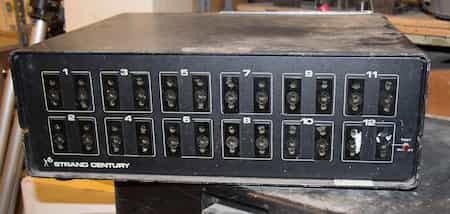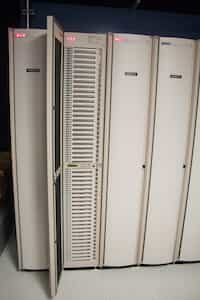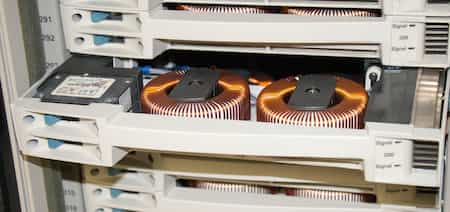Electricity and Power page 4 of 6
Types of Current
There are two types of current: direct and alternating.
Direct current
In direct current, the current runs only in one direction.Batteries are a prime example of a DC power source.
Alternating current
With alternating current, the flow changes polarity, which causes the electron flow to change direction.In the U.S. this change happens at sixty cycles per second (every 1/120th of a second). All household current is AC.
AC advantages over DC
Less expensive to produce
Less loss in voltage when sent long distances
Safer
DC advantages over AC
More portable
Motors are primarily DC engines
Primarily we use alternating current (AC) in the theatre. An additional reason for those already listed is that most direct current fixtures are not easily dimmable.
Theatres require large amounts of power. As this service comes from the power company, there are three standard types of power configuration.
This power supply is what determines the amount of dimmers and their capacity which may be used in the theatre.
This power supply is what determines the amount of dimmers and their capacity which may be used in the theatre.
This topic is available as an easy-to-print PDF.
Each of these systems contains one or more "Hot Legs" - each hot leg carries a specified amount of Amps.
1 phase 2 system
1 phase 3 system
3 phase 4 system
One phase Two contains one hot leg and one neutral.
Example: 100 amps x 1 hot leg = 100 amps
One phase Three contains two hot legs and one neutral.
Example: 100 amps x 2 hot leg = 200 amps
Three phase Four contains three hot legs and one neutral.
Example: 100 amps x 3 hot leg = 300 amps
* Most typical type of power service in the theatre world.
How can you figure out how much power you have, and how many dimmers you can use?
|
| American Theatre Standards Dimmer Chart | |||||
| Dimmer: | 1.2k | 2.4k | 3k | 4k | 6k |
| Amp usage: | 10 | 20 | 25 | 35 | 50 |
| Note: Often small cases of dimmers are only available in packs of 6 because they are cheaper to manufacture in this way - so check with your supplier to see what the local options might include. For large installations, racks may be configured in more flexible ways. | |||||
| 6-pack of dimmers (amps) | 60 | 120 | 150 | 210 | 300 |
| How many dimmers can you use? | |
| a) | (6) 2.4K & (6) 1.2K dimmers = 180 amps in a total of 12 dimmers |
| b) | (18) 1.2K dimmers = 180 amps in a total of 18 dimmers |
| c) | (6) 3K dimmers = 150 amps in a total of 6 dimmers |
| d) | (6) 3K dimmers & (5) 1.2k dimmers = 200 amps in a total of 11 dimmers or (20) 1.2k dimmers = 200 amps in a total of 20 dimmers but because it's unlikely you can find these configurations (since dimmers are typically in multiples of 6) this isn't a realistic option. |
As a lighting designer, you are not affected by the type of service - what matters most is the size of the service.
If you need to order equipment, however, you need to tell the theatrical supply house what type of service it is so that the supplier can give you dimmers that match the theater's configurations. If they don't match, the power needs to go through a converter or the dimmers won't work properly.
This was just a quick introduction to the concept of power service. It's good to have a basic understanding of how this works, but you will likely not run into these types of decisions for at least a few years into your career.Most likely you will begin working in spaces that already have dimmers installed.








